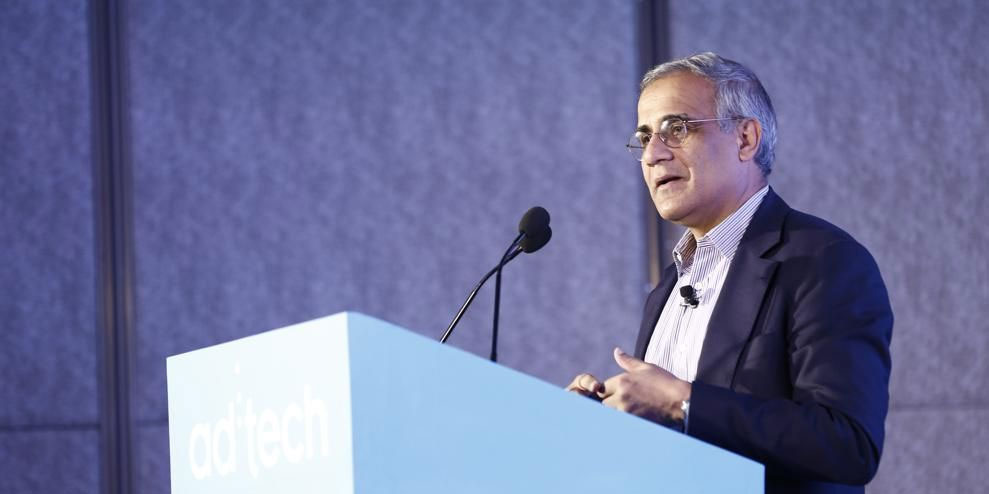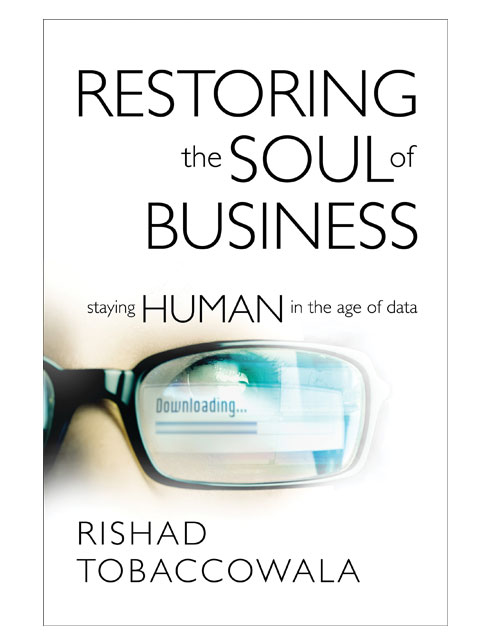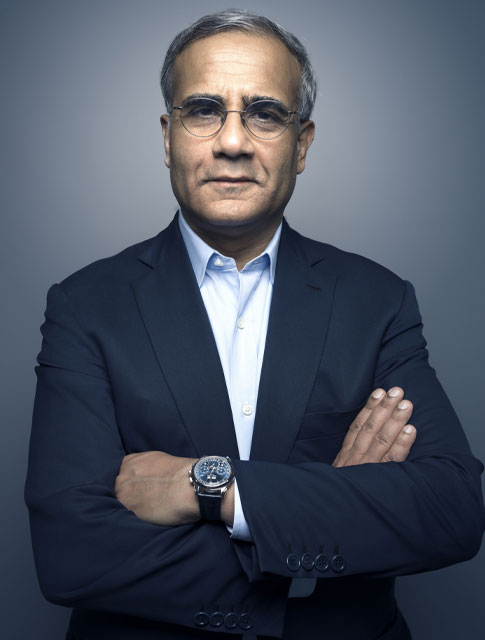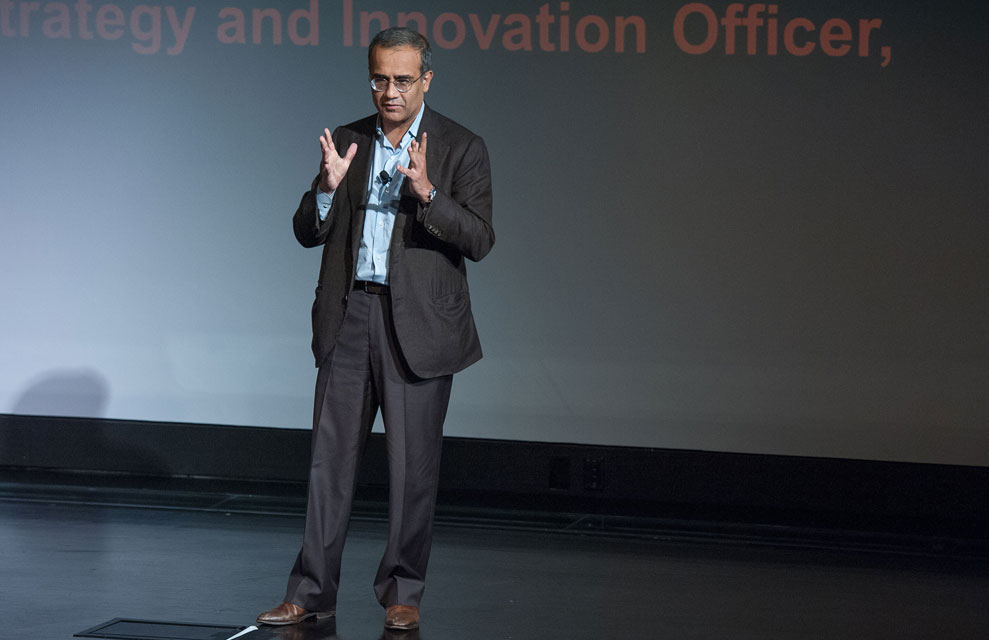Rishad Tobaccowala is the Chief Growth Officer at Publicis Groupe, one of the world’s largest advertising and communications firm. Over the last almost 4 decades, he has been helping leaders see, think and feel differently so they can grow their company, their brands, their teams and themselves. In this freewheeling conversation with BrandKnew, published by ISD Global, Rishad is at his Futurist best and brings forth his vast wisdom, insights and experience and talks a bit about his book ” Restoring the Soul of Business- Staying Human in the Age of Data ” , which I believe is a seminal piece of work and a must read for the business leaders of today and most certainly tomorrow. Read on to understand why Excelsheet has to meet Storytelling!
BK: Could you share a bit about your growing up days, your family etc?
RT: I grew up in Bombay,India. My father and mother worked for the Tata Group. I have one sister. Went to school at Campion and then to college at St Xaviers.
BK: What leaned you into advertising & marketing and kept you there for so long?
RT: I was fascinated by advertising and marketing because it combined business and art, numbers and culture. What kept me in the business for so long is that it kept changing as communication channels changed from the advent of cable to satellite to all flavors of online from search to social to gaming. In addition, my company allowed me to create new companies and initiatives so I kept doing new things while remaining in the same place.
BK: In an era of short stints for senior leaderships in most corporation, what explains your almost incredible three and a half decades with the Publicis Groupe?
RT: Three things have kept me at Publicis Groupe. First has been the opportunities they have afforded me to grow and learn and evolve my career. I have helped launch, lead or work in 12 companies in media, creative and data, in companies big and small and in roles that were operating and staff. Second has been the opportunity to participate in the change in the world of communication and culture as the Internet changed marketing. Thirdly and most important were amazing colleagues, bosses and clients since people make your job more than anything else.
BK: Were you always fascinated by math? Would you be happy if someone called you a numbers person?
RT: I wanted to be a writer but my parents made me do math which I ended up doing very well. I am a numbers person in that I am analytical, logical and am good at quantitative and in today’s data driven tech age it is good being seen as such. However, I am as much a liberal arts and story person in that I wanted to be and am a writer, I love culture and the arts and am happy dealing with the messiness of people versus just dealing with the discipline of numbers. Thus in reality, I am both art and science, story and spreadsheet.
BK: How comfortable are you with the idea of being a Futurist considering the fast shifting landscape that data and technology are bringing about?
RT: Futurist is what people call me. To be a futurist you have to be humble because you are often wrong due to disruptive technology. What has made me more right than wrong is that I have focussed less on technology but people’s hopes , dreams and aspirations which change much less than technology. I believe in technology which helps people have God like power that conquers space and time and which makes things easier, faster and helps them grow. Thus I could see search,social,voice and mobile phones success because they enabled these hopes and dreams.
BK: Share with us the big motivation behind writing your first book(that promises to be a best seller) ” Restoring the Soul of Business- Staying Human in the Age of Data “?
RT: As the world was becoming more data driven due to the rise of technology, the success of companies like Google, Amazon, Facebook and increased computing and processing power, I began to worry that businesses were tilting too much in the direction of the spreadsheet(data/math/logic) and forgetting that story( people, purpose, culture) were also key to success. This was leaving people disengaged at work, it was making firms make short term decisions that harmed the business in the long term ( Wells Fargo Bank opening fake accounts or Boeing hiding issues with the 737 Max) which destroyed shareholder value. Successful companies that survive for the long term, have purpose, invest in talent and think long term but companies were forgetting this. So, as someone known for digital, data and change, I thought I would be listened to by saying that in addition to this we needed soul in the business.
BK: You make a case in the book for the right balance between a spreadsheet and a story- could you elaborate on that?
RT: No business can work without the data, math, P&L statements and modern science on it’s side. The days of running businesses on hopes, dreams and press releases like WeWork are over. On the other hand, if one sees companies that succeed, they do more than the spreadsheet and math in that they invest in the story and meaning of the company. Why is Emirates and Southwest better than Air India and United. It’s not the math only because they are in the same industry but one group cares about employees, customers and the long term while the other runs things by the numbers. Successful companies need both spreadsheet and story.
BK: Did you foresee the Data Avalanche/Data Mutiny/Data Scrutiny coming? Do take us through that journey
RT: People love the convenience, personalization and savings that modern technology enables and much of this requires you to give up some data. However, at the same time they are beginning to realize that there are some big society and personal prices they have to pay. Facebook and Google are not just advertising operating systems but now society operating systems. They impact elections. Their scale and size likely hurts competition and innovation. We humans are not just consumers but also citizens, parents, members of community and these technologies have both an upside and a downside. Slowly from Europe to Asia there is a realization that new technologies need to be governed, discussed, monitored since they will impact society and people. This is particularly true with things like AI which is why Google and Microsoft and others are asking for regulation and discussion.
BK: 6 is the new 30. Shorter attention spans, vertical orientation, platforms like IGTV, the potential of UGC(User Generated Content): are we moving from the overt to the covert, appealing to the sub conscious rather than the conscious? What is your take and what are the learning and lessons for brand marketers and content creators in all these?
RT: People are less and less willing to be interrupted by advertising in a world where they can get low cost subscriptions (Netflix etc) to ad free content, where they have ad blockers on their browsers and phones etc. In addition, people have become more visual than verbal. Think about emojis or how words get shortened….microphone becomes mic etc. Because of this, messages are shorter and more visual. On the other hand, people are also spending lots of time with content- they like binge watching a show for hours they like or spending hours with messages and communication on You Tube. If you give me relevant, meaningful, useful content, I will consume it. If it’s an ad, make it easy to go down otherwise I will avoid it.
BK: AI, Machine Learning, Predictive Analytics, Data Science etc: where do you see the human being and the human mind in the midst of all this? And do all of these play out in a trust deficit eco sphere?
RT: Technology is inescapable and AI which is driven by machine learning to predict and anticipate behavior is progressing even faster than Moores Law ( AI power is doubling every 4 to 6 months while chips were doubling every 18 months) and there will be amazing breakthroughs and benefits. However, as I quote in my book “Algorithms are opinions embedded in code” and can be “Weapons of Math Destruction“. Human beings bring in bias into the code and we need to be aware of these. In addition, there are significant privacy and other issues. The answers are complex and not simple since we need to encourage science and development. The key is not to leave its development just to a few rich companies and people because of the impact on society.
BK: Could you define the Third Connected Age and it’s role in a Post Truth World?
RT: The First Connected Age was 1989 to 2007 with the advent of the world wide web and we connected to information (search) and transaction ( e-commerce).
The Second Connected Age started in 2007 where we were connected all the time ( smart phone), connected to everybody (social) and connected to computing (cloud). The Third Connected Age build on these two and will be about data connecting to data(AI), things connecting to things (IOT), new ways of connecting (Voice) and much faster connection(5G).
We are living in a post truth world only in that politicians and others are misleading people and these new technologies will continue to feed polarization and fantasy BUT these technologies are also science and advancement and the truth of reality cannot be wished away. Don’t vaccinate and you will die. Don’t accept climate change and you will die. So we are living in a real world hoping to be post truth and new technologies will help us both solve the problems and run away from them.
BK: Meaning, Purpose, Culture- few organisations that walk the walk on these seem to getting to where they want to? How does one make these contagious?
RT: The key is to realize that meaning, people and culture are not instead of or at the cost of profits, stock price increases and success but are key ingredients of success. The idea that one has to choose is not true. Every successful company combines them. The choice only has to be made if you are thinking short term. This book shows again and again that successful companies from Adobe to Southwest to Costco all do both.
BK: What would your views be on moving on from Brand Speak to Dialect Marketing- the language of the consumer- which of the brands in your understanding are getting this right?
RT: Very simple. Think human. Think people. Don’t speak to consumers or target audiences.
BK: Do you see the Future Competitive Advantage for organisations as a ‘ Collaborative Advantage ‘ wherein competition as is conventionally understood is spelled without the ‘m’ in it?
RT: Today we are living in a connected world and we need collaboration within companies and across companies. Teams matter. Trust matters. I always look for people who can help grow others because that is a sign that they will grow and are grown up.
BK: In our practice at ISD Global with brands and organisations, we have been proposing the value and impact of ‘UFP (Unique Feelings Proposition)’ and then by design move away from USP (Unique Selling Proposition) in an increasingly commoditised world. Do you see a new culture emerging based on the aforementioned?
RT: People choose with their hearts and use numbers to justify what they did. So emotions/feelings are key. However to engender positive impact you need also rational reasons that people can give for their choices. So even luxury brands while not using price will use things like design, provenance and other ways to differentiate. Differentiation matters but it’s more than a USP since today it is hard to have a sustained product advantage for most companies.
BK: What do you enjoy doing more- writing, speaking or consulting?
RT: I see myself in the cognitive services business where I help people see think and feel differently about how they can grow themselves, their teams and themselves. I advise rather than consult ( consulting is about decks, deliverables and advise is more about guidance and wisdom) and any and all combination of these three I enjoy.
BK: Could you tell us about the books and people who have inspired your life and career?
RT: My parents. My bosses particularly Jack Klues and Maurice Levy at Publicis and my wife and daughters are the most impactful people.
Most impactful books are Madame Bovary by Flaubert and Anna Karenina by Tolstoy who let you better understand people and humans than most and can create emotion and details of life that are remarkable. For non fiction, Tom Peters in Search of Excellence and in finance A Random Walk Down Wall Street.
BK: What makes Rishad Tobaccowala go ‘Wow, another day at work’?
RT: Today I work for myself and it’s particularly wow since I control my own time, am my own boss and no longer have to worry about employees. I always had great bosses, companies and clients but wow is when you control your time ( as much as any human can).
BK: What do you do in your spare time? Your leisure time pursuits?
RT: I love reading and movies. Swim a lot. Travel with my wife.
–
Seeking to build and grow your brand using the force of consumer insight, strategic foresight, creative disruption and technology prowess? Talk to us at +971 50 6254340 or mail: engage@groupisd.com or visit www.groupisd.com/story




